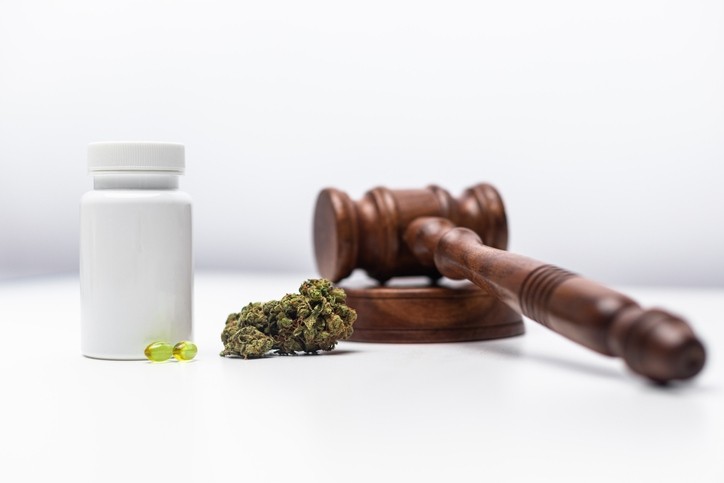Bipartisan support for cannabidiol puts FDA, CBD coalitions in spotlight

In a world of partisan political battles, cannabidiol may be a great unifier.
In July, Democrats and Republicans of both chambers of Congress released a Request for Information (RFI) to help legislators regulate hemp extracts like CBD.
Last week, representatives from the U.S. Hemp Roundtable, an advocacy group that speaks on behalf of 80 CBD and hemp companies and organizations, met with 50 members of Congress from across the aisle. Congressional members were either interested in moving legislation forward regarding hemp-based supplements and products or were genuinely curious and informed enough to ask meaningful questions, said Roundtable general counsel Jonathan Miller.
“There’s a growing consensus to do something quickly on CBD,” Miller said. “We’re seeing consensus on both sides of Capitol Hill. There were no real surprises [last week], except there’s consistent support. They all seem to agree with our genuine principles.”
Those principles are highlighted in the organization’s RFI.
The Roundtable’s authors wrote in the document that “we are open to the possibility of reasonable, science-based limits on CBD per serving in foods and dietary supplements. We do not believe limits are warranted for CBD in cosmetics. We take no position on CBD limits for tobacco products. Limits for ingestible hemp cannabinoids used in food or dietary supplements can be established using the available body of evidence and, under current authorities, each manufacturer of a hemp cannabinoid ingredient would be required to demonstrate safety in accordance with the requirements of the [Federal Food, Drug, and Cosmetic Act enforced by the US Food and Drug Administration] and its implementing regulations.”
They added: “We support House legislation that’s been introduced by a bi-partisan coalition led by Congressmen Morgan Griffith (R-VA) and Angie Craig (D-MN): HR 1628 would provide a regulatory pathway for CBD as food and beverage additives. H.R. 1629 would ensure that hemp-derived CBD, and other hemp ingredients, could be lawfully marketed as dietary supplements. In the upper chamber, Senators Ron Wyden (D-OR), Rand Paul (R-KY), and Jeff Merkley (D-OR) have introduced S. 2451, which would provide both regulatory paths. Rep. Earl Blumenauer (D-OR) has filed the companion bill to S. 2451 in this chamber.”
Miller said, “It’s been five years since the Farm Bill legalized hemp and CBD. The longer this continues to drag on, the harder it is for the industry to be competitive.”
The 2018 Farm Bill removed hemp from the Controlled Substance Act.
In July, Miller submitted written testimony before the House Committee on Oversight and Accountability, stating that farmers “relied on this government action, and invested considerable time and resources to plant, grow, and market commercial hemp crops, and particularly for the market for which there was immediate processing infrastructure and consumer demand: hemp-derived CBD and cannabinoids.”
However, a few hours after the Farm Bill was signed into law, the FDA reasserted its opinion that it was illegal to market CBD as a dietary supplement or to use it as a food additive.
“Beyond warning letters targeting illegal disease claims, such as that CBD cures cancer or Covid, the agency has not engaged in meaningful enforcement,” Miller told Congress. “But its inconsistent position, coupled with lack of action, has cast a cloud over the industry.”
Independent studies predict that if the FDA issues regulatory guidance by the end of 2024, the hemp-derived CBD market will top $11 billion by 2027 but will fall $4 billion short if there’s no FDA action, he said.
FDA: "A new regulatory pathway for CBD is needed"
When asked to comment, an FDA spokesperson told NutraIngredients-USA: "The FDA convened a high-level internal working group in 2019 to explore potential regulatory pathways for CBD products. The FDA collected information from a variety of sources, including scientific literature, an open docket, product sampling and analysis, FDA-led toxicological studies, adverse event reports, and studies that had been done as part of drug development. After careful review, the agency announced in January 2023 that, given the available evidence, it is not apparent how CBD products could meet safety standards for dietary supplements or food additives. Under the law, any substance, including CBD, must meet specific safety standards to be lawfully marketed as a dietary supplement or food additive.
"A new regulatory pathway for CBD is needed that balances individuals’ desire for access to CBD products with the regulatory oversight needed to manage risks. The FDA’s existing dietary supplement authorities provide only limited tools for managing many of the risks associated with CBD products. The agency is prepared to work with Congress on this matter. Please see the agency’s statement from January 2023.
"We were pleased to see the RFI and Congress’s desire to have a better understanding of the complex landscape and the many points of view."
Differing ideas of oversight
A spokesperson for the Council for Responsible Nutrition told NutraIngredients-USA that the FDA is abdicating its responsibilities by its continued downplaying, underestimating, or misrepresenting its capabilities under DSHEA—which amended the Federal Food, Drug, and Cosmetic Act to establish standards with respect to dietary supplements—as a means of establishing new staff and resources to regulate CBD.
“The FDA can and should regulate CBD as a dietary supplement now and doing so would save consumers from continuing to navigate a CBD marketplace without any guardrails imposed on these products,” they said.
However, other organizations are advocating for new barriers.
Another coalition, One Hemp, recently formed to “advance CBD as a dietary supplement through bipartisan legislation that strikes the right balance between FDA concerns and industry stability,” according to the organization’s website. The group also submitted an RFI to the House Energy and Commerce Committee and to the Senate Committee on Health, Education, Labor, and Pensions (HELP) Committee.
Kelly D. Fair, strategic advisor to One Hemp and organizer of the group’s RFI submission, said “One Hemp advocates for industry requirements to disclose hemp-derived product warning statements addressing the FDA's public risk concerns and product safety and non-impairment recognition at certain dose levels based on credible scientific data.”
One industry source told NutraIngredients-USA that a warning statement or hazard label prevents the ability to put a structure function claim on a product. These claims describe the role of a nutrient or ingredient on the structure or function of the human body.
“You won’t be able to tell why the product will be beneficial for you when these warning statements are in place,” the source said. “They disincentivize organizations from doing CBD safety studies. And it’s not just safety, it’s also quality.”
Several of the organizations that are part of One Hemp are financially backed by tobacco companies, including Charlotte’s Web, which is funded by British American Tobacco. The source said tobacco companies, used to providing hazard warnings for cigarettes, are applying those same standards for CBD.
Gutting DSHEA
However, to put a one-size-fits-all hazard label on a product is viewed by some as an urgent attempt to sway regulators and could create problems for the CBD market.
“It guts DSHEA,” said Daniel Fabricant, president and CEO of the Natural Products Association. “We have premarket safety and that’s important. We want to be subject to the same rules that any other new ingredients or extract in the food supply would be subject to.”
Additionally, under One Hemp’s plan, any company selling a cannabidiol product could be waved from conducting a required safety study for anything under 100 mg, according to Fabricant.
“Hemp is very special, but the notion that the regulatory system doesn’t work is very self-serving,” he said. “It’s not a good message, it’s not good for credibility for anybody.”
DSHEA requires that “a manufacturer or distributor notify FDA in advance and submit safety information if it intends to market a dietary supplement in the United States that contains a new dietary ingredient (NDI).”
Fabricant said one reason DSHEA was passed in 1994 with bipartisan support was because of the NDI provision.
Studies from cbdMD show that 160 mg per day of CBD in a 70 kg person is safe. Data that One Hemp’s Fair shared with Congress suggested 70 mg per day is considered safe for consumption by all healthy adults, and 100 mg per day is considered safe for most healthy adults, excluding those who are trying to conceive, pregnant and/or lactating.
The FDA has expressed on several occasions that it has concerns around the safety of CBD, mostly based on the data from drug trials.
Across the US, a patchwork of state requirements has left consumers and industry alike confused about health, safety, and labeling for CBD. Currently, cannabidiol is only FDA-approved for Epidiolex, a drug used to treat rare seizure disorders, and can cost patients up to $35,000 per year for medications, according to estimates from the Roundtable.















